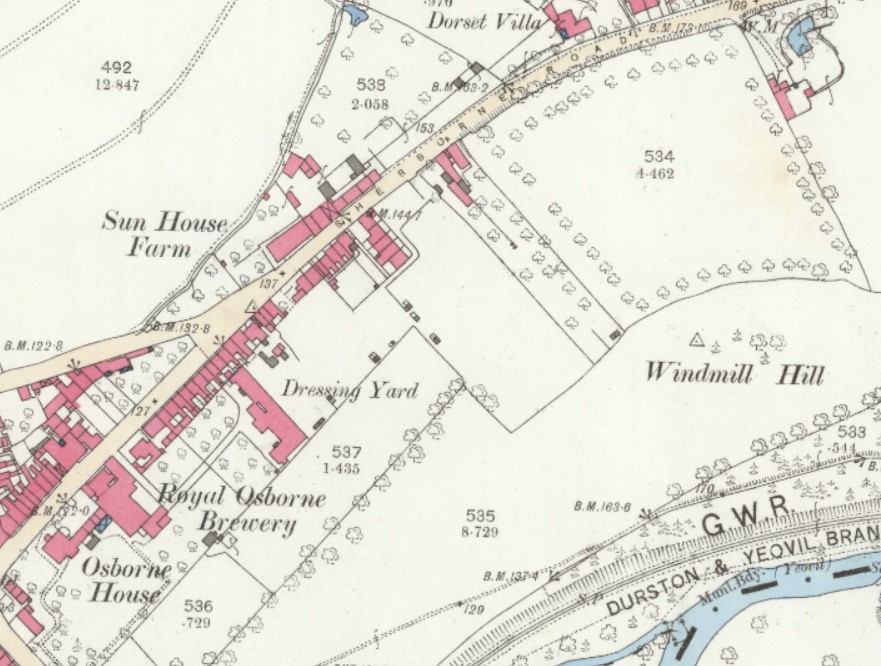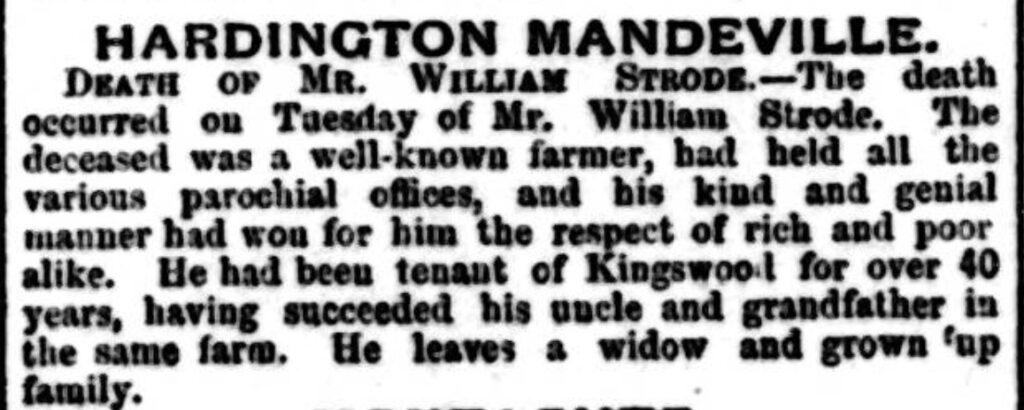Introduction
William John Strode’s life story reflects themes of agriculture, family, personal grief, religious affiliation and community engagement. Born into a dairyman’s family at Haselbury around 1833, William initially trained as a carpenter and joiner. However, family circumstances led him to change to farming, managing a dairy at Yeovil before ultimately becoming the tenant of Kingswood Farm, Hardington. Despite enduring the tragic loss of two daughters to tuberculosis, he exhibited remarkable resilience, earning the affection and respect of his peers for his “kind and genial manner.”[1] Furthermore, his active participation in horticultural societies and local governance demonstrated his generous community spirit.
Childhood and early life
William was born at Haselbury around 1833, the youngest of two children born to William and Elizabeth Strode. His father, William, was a dairyman at Molton’s Farm, who later took on successive dairies at Minterne Magna, Pendomer, and East Coker. He died at East Coker on 2 August 1857 from lung and heart disease at the age of 57, leaving behind his widow, William and William’s sister, Elizabeth.[2]
In addition to helping with the family business, William trained as a carpenter and joiner.
Marriage
On 1 February 1859, while living at East Coker, William married Rebecca Reed Lane by banns at Wiveliscombe parish church. Rebecca came from Nether Compton, where her father was a carpenter, like William; her mother had died a year earlier. For some reason, Rebecca preferred to be married in Wiveliscombe (where she was probably in domestic service) rather than in her home parish of Nether Compton.
Dairying and joinery in Yeovil
After his marriage, William and his mother ran a dairy of 21 cows at Sun House Farm, Sherborne Road, Yeovil, where William combined dairy work with joinery.[3]
Local newspapers provide a glimpse of William’s life at this time. In April 1865, both he and his wife testified against a watchmaker accused of pawning William’s watch instead of repairing it.[4] William said he had met the watchmaker at the Greyhound Inn and Elephant and Castle, which suggests that William was a regular customer of those establishments.
While living at Yeovil, William and Rebecca had four children.
Move to Kingswood Farm, Hardington
Around 1868, William and his family, including his mother, moved to Kingswood Farm, Hardington. His sister, Elizabeth, was already there, as she worked as a dairymaid for her grandmother, Ann Slade, and had stayed on at the farm after Ann’s death.
The 1871 census shows William as a farmer of 287 acres, employing three men and one boy. A decade later, he farmed 284 acres and employed one labourer.
An extraordinary baptism ceremony
Between 1868 and 1876, William and Rebecca had another four children. On Thursday. 10 May 1877, all eight children were baptised at Hardington Church on the same day. A possible explanation is that Rev Vassall, Hardington’s rector, undertook a pastoral visit to the farm because William’s mother was ill (she died towards the end of the year) and, upon finding that William’s children were unbaptised, convinced him of the need for urgent action. The resulting collective baptism of eight siblings aged between one and sixteen must rank as one of the most remarkable episodes in the history of Hardington Church, though few witnessed it.
The idea that William succumbed to outside pressure is supported by the fact that no baptism record exists for William’s last child, Bertie Cecil, who was born in late 1878 or early 1879.
The tragic loss of a daughter
On 19 June 1879, William’s daughter, Ann Slade, died of phthisis pulmonalis (tuberculous), which she had contracted six months earlier.[5] Her untimely death at the age of 14 and the harrowing manner of her illness must have had a devastating impact on the family.
Familial changes and religious participation
In the 1880s, four of William’s children left home. His eldest child, Elizabeth Alice, married John Hall Beater Dunell, a farm bailiff at Athelhampton, in 1883. Thomas and Amelia relocated to London, and William Henry may have gone abroad as he disappeared without a trace.
William’s daughter, Mary, became an active member of Hardington Church, contributing to the decoration of the church for Christmas and Harvest Festival from 1887 to 1894. Her involvement may have been influenced by a fear of succumbing to the same fate as her sister Ann, and tragically, she did die of the same illness on 26 July 1898, aged 31 or 32.[6] As some newspaper reports refer to “the Miss Strodes” decorating the church, she must, on those occasions, have been accompanied by her sister, Amelia Kate, or her aunt, Elizabeth Strode, or both.[7]
William’s wife, Rebecca, also participated in church activities, notably serving tea at the annual Church of England Temperance Society gatherings in 1889, 1893, and 1894.[8]
As for William himself, the only evidence of his support for the church rests on one meeting. On 22 May 1888, he attended Rev Cleife’s lecture on Lisbon, from where Cleife had just returned. Following Cleife’s announcement that his uncle, John Cleife of Lisbon, was about to present the church with a Bible and pay for repairs to the west roof, William proposed a vote of thanks to the kind benefactor.[9]
Participation in horticultural societies
The North Perrott Cottage Garden and Horticultural Society, which operated from 1882 to 1887, had a much greater influence on William’s life. He and his wife won many prizes for their vegetables, flowers and honey, and William also served on the committee.[10] In 1885, he won a prize for his potatoes at the Sherborne Flower Show, while his wife secured first prize for her honey at the Melplash Show in 1886. [11]
Local government
William’s involvement with the horticultural society likely fostered his interest in committee work. By October 1893, he had joined the Crewkerne Highways Board, and in 1897, he was elected a Poor Law Guardian.[12]
In December 1894, William secured a place on Hardington’s first parish council and was elected chairman.[13] He was also elected as Hardington’s first district councillor. [14] When the council met in April 1895, members were divided about whether to re-elect William as chairman, and he volunteered to leave the room while they discussed it. When he returned, he discovered that they had elected Cleife instead.[15]
In the parish council election of April 1897, William did remarkably well, obtaining 46 votes, which put him in second place behind Abraham Genge, who secured 56.[16] The following year, however, he lost his seat after only securing 26 votes. He also lost his position as a district councillor.[17]
“You are attacking me!”
Meanwhile, he had volunteered for the clerk’s role but incurred intense criticism for his pains. At a heated meeting in January 1898, Cleife heavy-handedly objected to how his words had been recorded. Feeling bullied and put upon, William burst out, “You are attacking me…You have written to me and threatened a criminal prosecution.”[18] Understandably, William missed a parish meeting eleven days later to discuss Cleife’s pet project, the parish bier, citing ill health.[19] By then, he was probably suffering from the heart disease and dropsy that would eventually kill him. He never attended another parish meeting, and in May 1898, three parish councillors visited his Kingwood to retrieve the parish chest, which they found in a granary, surrounded by oil cake and empty sacks.[20]
Death
William died at Kingswood on 31 October 1899, at the age of 67, leaving an estate valued at £771 6s.[21]
Rebecca’s later life
Rebecca remained at the farm, passing away on 12 January 1908, at the age of 73. She died intestate, leaving a small estate of £14 11s 9d, which was administered by her son, Frances.
Children
Circa 1860-Elizabeth Alice (married John Hall Beater Dunell, a bailiff);
1863-William Henry (missing from the records after 1881);
1864-Ann Slade (died aged 14);
1866-Mary (died aged 31 or 32);
1868-Thomas (worked as a shop assistant in London);
1871-Amelia Kate (married William Moore, a farmer; lived as a widow in Haselbury for more than thirty years;
1874-Arthur Frederick (farmed at North Down Farm, Haselbury, after marrying in 1907);
1876-Francis John Read (never married; farmed at Kingswood until after his brother Bertie’s death, when he retired to Haselbury; died in 1944; interred at East Chinnock);
Circa 1879-Bertie Cecil (never married; farmed at Kingswood until his death from a cerebral haemorrhage and heart failure in 1918; interred at East Chinnock).
The will of William John Strode
Executors and trustees: my wife, Rebecca Read Strode, and John Patch of Haselbury Mills, Miller.
To my trustees: all my property to convert to money and invest, paying the income to my wife during her lifetime, and on her death to divide the capital equally between my children who being sons attain the age of 21 or being daughters attain that age or marry. They can postpone any sale as long as they wish and continue occupying Kingswood Farm.
Wit: Wm F Walter, clerk to Messrs Moore, solicitors, Yeovil.
Elizabeth Strode, Kingswood Farm, Hardington.[22]
References
[1] Pulman’s Weekly News and Advertiser, 7 November 1899, p.6.
[2] Death certificate of William Strode; Sherborne Mercury, 11 August 1857, p.6.
[3] Western Gazette, 21 April 1865, p.6; 1861 census.
[4] Western Gazette, 21 April 1865, p.6.
[5] Death certificate of Ann Slade Strode.
[6] Death certificate of Mary Strode. The certificate recorded her age as 29, but she was older.
[7] Western Gazette, 16 September 1887, p.7; Western Gazette, 27 September 1889, p.6; 30 September 1892, p.6; Western Gazette, 1 January 1892, p.6; 30 December 1892, p.5; Pulman’s Weekly News and Advertiser, 12 September 1893, p.5; Western Gazette, 28 December 1894, p.6.
[8] Western Gazette 29 November 1889, p. 7; Pulman’s Weekly News and Advertiser, 24 October 1893, p.6; 2 October 1894, p.6.
[9] Western Gazette, 25 May 1888, p.6.
[10] Western Gazette, 1 September 1882, p.6; Western Gazette, 22 August 1884, p.7; Western Gazette, 28 August 1885, p.3; Western Chronicle, 20 August 1886, p.7; Western Gazette, 26 August 1887, p.8.
[11] Southern Times and Dorset County Herald, 28 August 1885, p.7; Western Gazette, 22 October 1886, p.8.
[12] Pulman’s Weekly News and Advertiser, 24 October 1893, p.5; Bristol Mercury, 19 March 1898, p.8; Western Gazette, 25 March 1898, p.6.
[13] Western Gazette, 7 December 1894, p.7; 21 December 1894, p.6.
[14] Bristol Mercury, 10 December 1894, p.6.
[15] Western Chronicle, 26 April 1895, p.6.
[16] Pulman’s Weekly News and Advertiser, 13 April 1897, p.6.
[17] Pulman’s Weekly News and Advertiser, 12 April 1898, p.6.
[18] Pulman’s Weekly News and Advertiser, 18 January 1898, p.6,
[19] Pulman’s Weekly News and Advertiser, 25 January 1898, p.6
[20] Pulman’s Weekly News and Advertiser, 17 May 1898, p.5.
[21] Pulman’s Weekly News and Advertiser, 7 November 1899, p.6; the will of William John Strode, dated 26 April 1899, proved at Taunton on 18 January 1900.
[22] The will of William John Strode, dated 26 April 1899, proved at Taunton on 18 January 1900.







